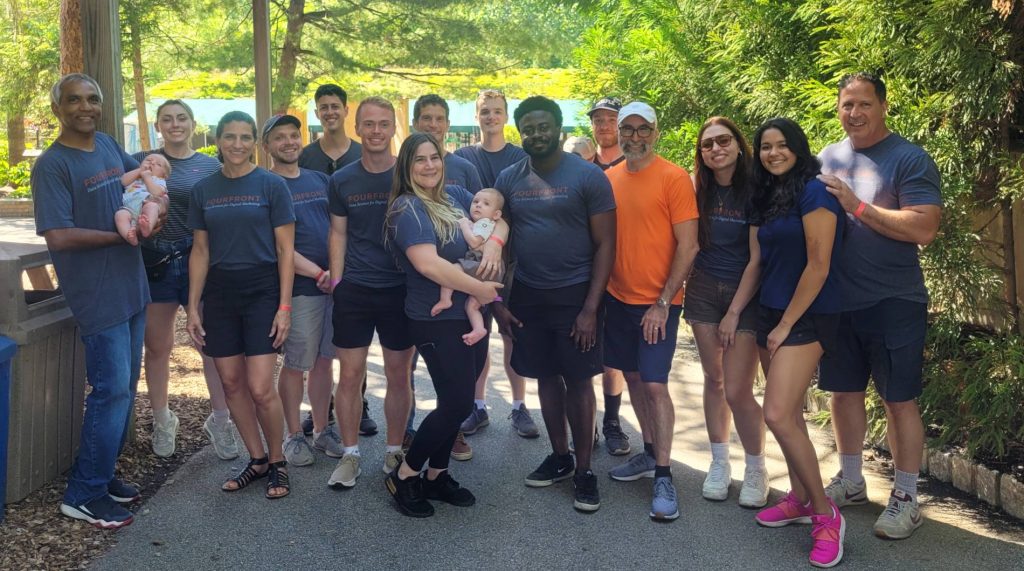The future of SEO has never been more open than it is right now. Between the meteoric rise of artificial intelligence in marketing and major shifts in search engine algorithms, there’s a lot to take in while making the most of your SEO efforts.
To help contextualize the current and future state of the SEO, I sat down with FourFront’s CEO Bob Scavilla and SEO Manager Jared Groff to explore their thoughts on where the industry is and where it’s going. Whether you’re a seasoned professional or just breaking into search marketing, this Q&A session can give everyone actionable food for thought on how they approach SEO going forward.

How would you describe the current landscape of SEO?

15 years ago, SEO revolved around the semantic breakdown of text and page structure. The number of inbound links, their anchor text, and the relevancy of the page determined its ranking. It was a mechanical process, with search engines using these factors to decide on which pages to impress for a given keyword. However, it was also easy to spam search engines and trick them into ranking less relevant pages higher.
Today, search engine algorithms have evolved significantly. They can interpret page relevancy, understand user intent, and analyze a wide range of data to determine the best results for a query. Semantic understanding of text is still crucial, but it’s just one aspect of SEO. Search engines now assess the relevance of text to the query, the quality of the page, its design, and a multitude of other factors.
The current SEO landscape is vastly different. Link building, which used to be a primary focus, has taken a backseat. Instead, SEO is about catering to the needs of the audience. It involves providing informative content that addresses the audience’s requirements. This is called Content Gap Fulfillment, which is where you have to actually meet the full requirements or most of the requirements of the audience before you get an impression for a page.

How has FourFront evolved alongside SEO? How has that evolution differed from the paths of other agencies?

A lot of it might sound funny, but the foundation of FourFront was built on the idea that Google prioritized high-quality content that fulfilled audience needs. We disregarded the other tactics prevalent in the SEO industry, which often bordered on unethical practices. Our approach was never about taking shortcuts or exploiting loopholes in algorithms. In fact, whenever algorithm updates rolled out, our clients typically saw better results afterward, reflecting our commitment to ethical practices.
Our focus was always on understanding and meeting audience requirements. At FourFront, we believed in the symbiotic relationship between audiences and brands. Each brand has its unique value proposition, which enables it to address the needs of its audience effectively. Our role, anchored in website development and messaging, was to bridge the gap between these entities.
Each brand has its unique value proposition, which enables it to address the needs of its audience effectively.

We continue to emphasize knowing your audience, creating resonant content, ensuring messaging alignment with audience needs, and highlighting brand values. This steadfast approach hasn’t changed. What has evolved is people’s understanding of how to derive ROI from SEO companies like FourFront.

The core philosophy of FourFront has remained consistent throughout my time here and since our inception. One aspect I’ve always valued is our openness to non-traditional thinkers. We’ve embraced individuals from diverse backgrounds and experiences, including those outside the conventional realms of marketing. Their contributions have enriched our processes and ultimately led to better outcomes.
Along the journey, we’ve always encouraged individuals to explore various facets of SEO, whether it’s UX, data visualization, programming, or content creation. We’ve provided the flexibility for them to learn and develop skills in these areas, fostering a culture of continuous growth.
We’ve never confined ourselves to traditional approaches. Instead, we’ve encouraged our team to leverage their unique passions, skills, and experiences to enhance our offerings and provide our clients with the best possible product. Our willingness to think outside the box has been a cornerstone of our success.

Bob, how would your rate your satisfaction of FourFront’s evolution?

I’m highly satisfied, I’ll tell you that much. My background and experience originally lied in coding and data management – not necessarily in business. During my time as CEO – and even more rapidly in the last five years – I’ve been actively honing my business skills to help FourFront reach the heights I know it can achieve.
Our path to growth involves capitalizing on new opportunities and turning them into revenue and profit. From the outset, I positioned myself as a directional leader rather than a micromanager. I hire people to do a job and trust them to excel at it. I’ve always emphasized to the team: “Don’t just bring me your best. Give me everything you’ve got.” And I’m proud to say that’s exactly what they do. We have a team of individuals who understand their role within FourFront and take ownership of their responsibilities.
I've always emphasized to the team: "Don't just bring me your best. Give me everything you've got." And I'm proud to say that's exactly what they do.

Take [our Lead Data Analyst] Anthony, for example. He can handle operations better than I can. If I were to step in without his knowledge, he’d put me in my place without hesitation. That’s the kind of environment I want to foster—a place where people feel empowered to take charge, make mistakes, and learn from them. And that’s exactly what we have at FourFront right now—a team of strong-minded individuals who have a voice.
[Our HR & Administration Manager] Christina is another perfect example of this. If I were to step into her work and do too much, she’d let me know, and that’s exactly how it should be. Everyone at FourFront knows their role and performs it admirably.
While I’ve worn almost every hat at FourFront since its inception, I can confidently say that the current team executes their roles better than I ever could. And that’s something that brings me immense satisfaction.

Fast forward 10 years – what does SEO (and digital marketing) look like?

Right now there’s a surge in technology development driven by the demands of search and the internet. Amazon, for instance, is heavily investing in computer infrastructure to support their AI technologies.
Having been in the industry for some time, I understand that traditional resources won’t suffice to meet the demand for AI. What’s needed is a paradigm shift. AI represents such a shift, much like previous technological advancements such as the advent of personal computers and telephones.
AI requires computing power on a scale vastly greater than what’s currently available. As computing power increases, more advanced algorithms become feasible. This is crucial not only for search, which lies at the core of digital marketing due to its ability to monitor behavior patterns but also for other areas.
For instance, Google can already track various aspects of our lives, such as our driving habits and social interactions, with conventional computing power. Imagine what could be achieved with a million-fold increase in computing power, potentially leading to highly advanced search capabilities and advancements in fields like bioinformatics and biocomputing.
Imagine what could be achieved with a million-fold increase in computing power, potentially leading to highly advanced search capabilities and advancements in fields like bioinformatics and biocomputing.

The future state of SEO and computing is uncertain, but it’s evident that it will demand exponentially more computing power. In around ten years, the introduction of quantum computing could usher in significant changes. We’re currently just scratching the surface of what computing can achieve, and the next decade promises to bring about transformative developments.

Historically, when we think of marketing, it’s often about the creativity of campaigns and how effective those creatives are. In recent times, there’s been a shift towards measuring the success of campaigns more precisely. Marketers, both in digital and traditional realms, have become more conscious of ROI and success metrics.
However, as technology has advanced, we’ve seen a trend towards more personalized experiences. Marketers now have access to detailed data points about consumers, such as their location, interests, and search behavior. Yet, consumers have also become increasingly concerned about privacy and data tracking.
In the next five to ten years, we should anticipate stricter regulations on user and customer privacy, similar to GDPR in Europe. This will necessitate a greater emphasis on data analysis to make informed decisions. Ironically, while we may have less access to data due to privacy concerns, we’ll need to rely on it even more heavily for decision-making.
In the next five to ten years, we should anticipate stricter regulations on user and customer privacy, similar to GDPR in Europe.

The industry, especially in digital marketing, has become overly reliant on granular data. Moving forward, we’ll need to focus on using the right metrics for decision-making, even in the face of reduced data availability. This shift reflects broader concerns about privacy and data protection.

AI is obviously the golden buzzword right now. Do you think SEOs are using it to its full potential?

No, most SEOs don’t fully grasp it. Google essentially gathers vast amounts of data from the internet, which serves as the training data for its machine learning systems. This data is analyzed, interpreted, and used to provide relevant results for user queries. When talking to most SEOs, many of them understand the concept of machine learning systems but lack deeper knowledge of their inner workings, such as vector space and large language models.
AI encompasses much more than just large language models like ChatGPT; it includes machine learning, algorithms, predictions, and various other nuances. Understanding these complexities is crucial for creating effective SEO strategies.
So far, I haven’t come across another SEO company that matches FourFront’s understanding of applying AI in different scenarios.

Do you believe that Google and its competitors are truthfully doing their part to make The Web a better place?

Yeah, I believe they are. I’ve observed a significant improvement in website quality, driven by the requirements of search engines. Nowadays, creating visually appealing websites with well-designed creatives is a crucial aspect of SEO. It’s remarkable how search engines have managed to combat spam over the years, considering the rampant misuse of SEO tactics in the past. While they’ve undoubtedly made the web a better place, one can’t help but wonder about their underlying motives.
Profit is not inherently evil, and it’s understandable that companies like Microsoft and Google seek to maximize their earnings. However, the vast amount of data they possess raises concerns about privacy and misuse. While I personally feel somewhat obliged to trust these companies, given their pervasive presence in society, I wouldn’t be surprised if governmental regulations eventually curtail their control over user data.
Take Google for example, which reportedly receives thousands of subpoenas for data every day. This raises questions about the extent of their data collection and the potential risks associated with it. Governments may eventually step in to regulate and facilitate the handling of such data, particularly for forensic purposes in legal cases.
Depending on how much scrutiny Google faces, this could very well be what initiates a tipping point that will cause them to relinquish their long-standing hold on the search marketing industry.

As SEO evolves further, are there any real-world marketing factors that SEOs should pay close attention to?

Definitely. I think in terms of SEO, it boils down to understanding a brand’s unique value and how it resonates with audience requirements. Whether you’re advocating, promoting, informing, or instructing, the essence remains the same. Google evaluates various types of queries, but the fundamental link between brand value and audience needs remains constant. What’s evolving is the intelligence of search engines and their ability to determine relevance.
Everyone wants to decipher the factors Google considers in its decision-making process. However, what truly matters is understanding audience requirements. By analyzing search results, you can glean valuable insights into the true intent of a keyword. For instance, the presence of paid ads, featured snippets, local maps, or shopping carousels indicates the level of user engagement associated with a keyword.
SEO professionals should focus on meeting Google’s requirements, such as building trustworthiness and authority at scale, rather than obsessing over the specifics of Google’s algorithms. The concept of E-E-A-T (Experience, Expertise, Authoritativeness, Trustworthiness) underscores the importance of establishing credibility. If you’re recognized as a thought leader in your industry, Google will prioritize your content over your competition.
SEO professionals should focus on meeting Google's requirements, such as building trustworthiness and authority at scale, rather than obsessing over the specifics of Google's algorithms.

Google’s emphasis on authority dates back to its early days when Warren Buffett’s Word document-inspired website defied traditional SEO guidelines but garnered immense traffic due to his authority in the investment world. Today, with advanced tracking capabilities, Google relies more on the authority and trustworthiness of individuals to influence search results.
In essence, as Google becomes more adept at understanding user behavior, establishing real authority on topics will be crucial in influencing search rankings.

If you could give one piece of advice to a new or struggling SEO, agency, or in-house team, what would it be?

Many new SEOs and agencies make the mistake of focusing solely on website traffic or social media likes. This approach is flawed. SEO should prioritize the productivity of the website.
It’s essential to clearly understand what clients truly want. Often, they express a desire to rank number one for a specific keyword, but what they really want is to generate business and profit from the internet. The association between SEO and revenue generation must be clarified and emphasized from the outset.
Judging the success of an SEO engagement solely based on keyword rankings is misleading. A better approach is to analyze lead generation metrics, such as lead flows, seasonality, and lead funnel performance.
Understanding channel attribution is also crucial. Each channel contributes differently to lead generation and revenue generation. For example, while Facebook may not directly convert leads at a high rate, it can significantly impact brand awareness and generate branded queries, which ultimately leads to revenue.
Are you prepared for the future of SEO?
As Bob and Jared have laid out, there are plenty for SEOs to ponder as the industry evolves over the next few years.
SEO will certainly outlast the rise of AI and adapt accordingly, but the practice as we know it today will change more quickly than ever before.
So, are you prepared for what the future holds? Let us know your thoughts on the current and future state of SEO down in the comments.









